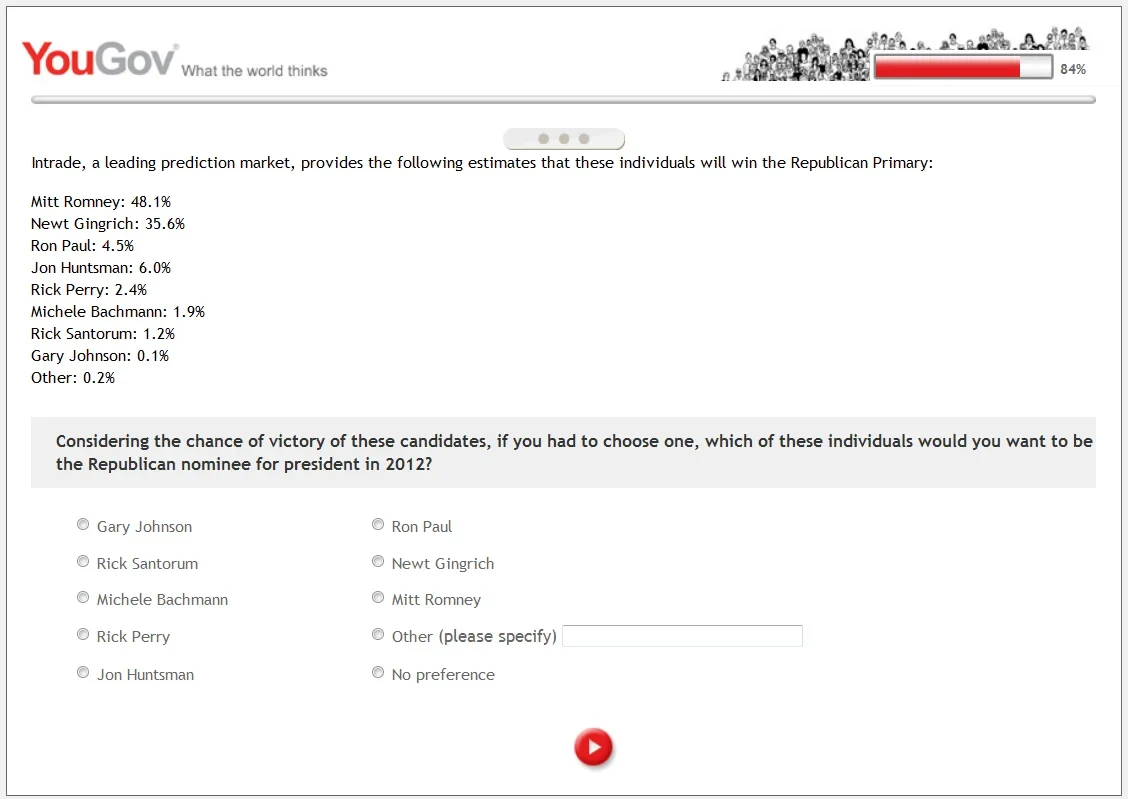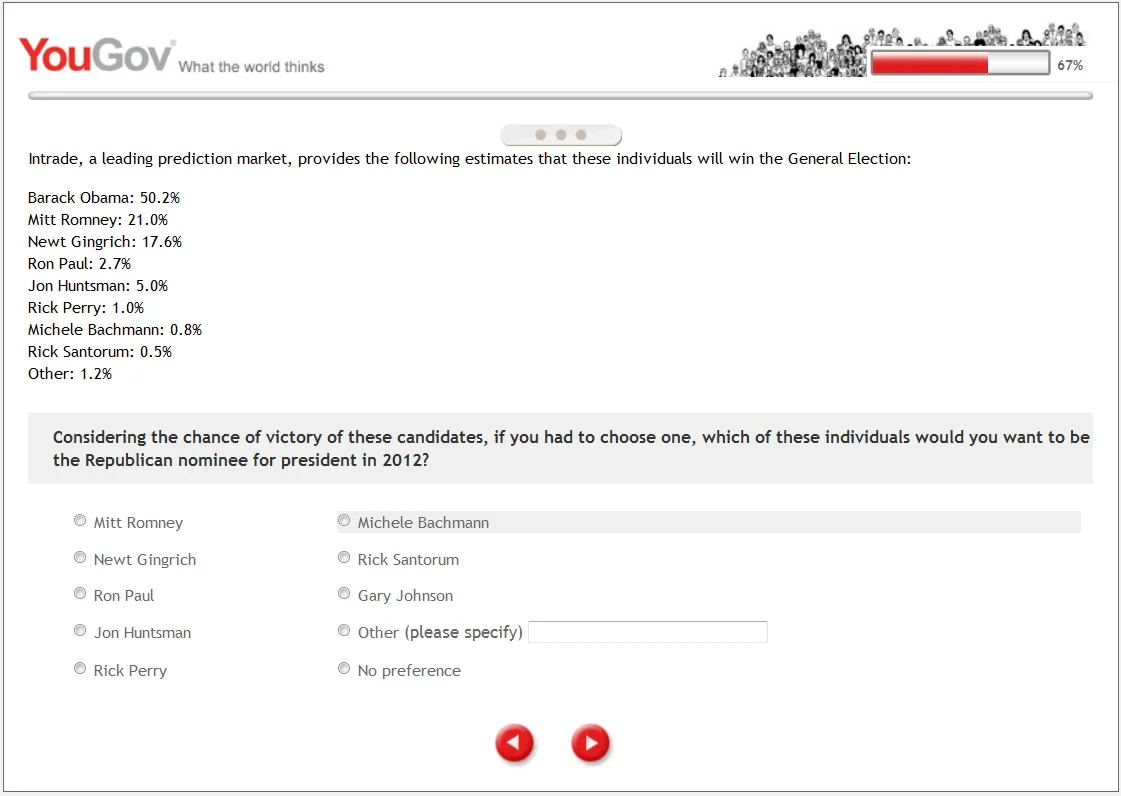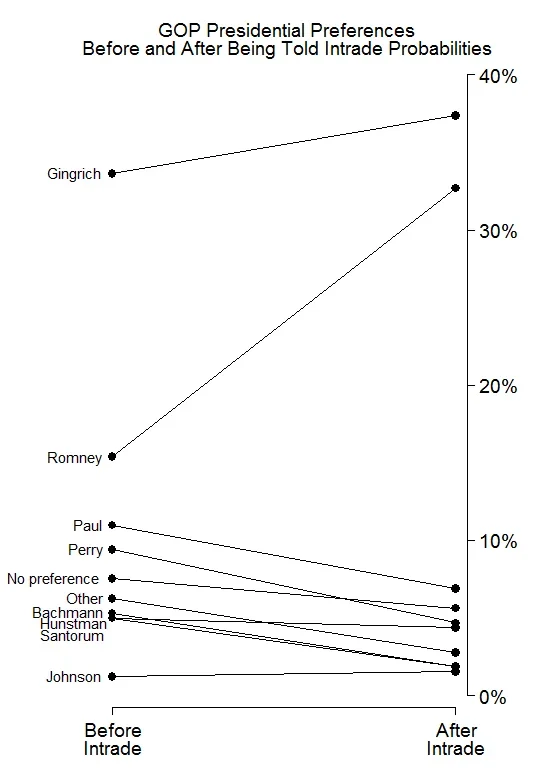Presidential primaries often come down to this choice: do you vote for the candidate you like the most, or do you vote for the candidate who is most likely to win? Factions within political parties often disagree over this question. This election season, Republicans have debated whether to nominate someone like Mitt Romney, whose conservative credentials have been questioned, or whether to nominate another candidate, such as Rick Perry or Herman Cain or Newt Gingrich, who is perceived to be more reliably conservative but possibly less able to beat Barack Obama. In the language of social science, should Republicans choose sincerely or strategically?
In a YouGov poll conducted from December 3-6, we investigated whether sincere or strategic motivations would prevail. Respondents who intended to vote in a GOP primary or caucus (N=318) were first asked both their preferred candidate and their second choice. (Because the survey was conducted after Cain dropped out, he was not included among the options.)
Subsequent to this, the survey included a brief experiment that exposed respondents to information about electability. Respondents were randomly assigned to see: (1) each candidate’s chance of winning the GOP nomination; (2) each candidate’s chance of winning the general election, or (3) both pieces of information. Then, respondents were asked again for their preferred candidate.
The candidates’ chances of winning were taken from the betting market Intrade, as of December 3, 2011. For example, here is what respondents would have seen if they were presented Intrade probabilities for the GOP nomination:

And here is what respondents would have seen if they were presented probabilities for the general election:

Seeing these probabilities did make a difference: 35% of respondents changed their preferred candidate. The general election probabilities were particularly effective: about 40% of people who saw these probabilities—either by themselves or with the nomination probabilities—changed their minds. By contrast, 28% of those who saw only the nomination probabilities changed their mind.
The probabilities suggest that only two candidates have a real chance of winning the nomination or the general election—Romney and Gingrich—and that Romney’s chances are better than Gingrich’s. After seeing one or both sets of probabilities, strategic voters should shift toward these candidates and away from the others, and they should shift more toward Romney than Gingrich. That’s exactly what happened.

At first, Gingrich had a large lead over Romney (34% vs. 15%). But after being given either set or both sets of Intrade probabilities, Republican voters were much more likely to support Romney: 33% did so. Meanwhile, Gingrich’s standing increased by only 3 points, to 37%. Almost every other candidate lost support, especially Paul, Perry, Bachmann and Santorum. The percentages of respondents saying “other” or “no preference” also declined.
But the nomination and general election probabilities each had a very different impact. Among GOP voters who saw only the nomination probabilities, Gingrich did better, garnering 47% of the vote. Romney’s numbers increased as well, to 23%, but Gingrich’s lead remained essentially the same.
Romney was helped instead by the general election probabilities. Among those who saw only those probabilities, Romney led Gingrich, 36% to 29%. Among those who saw both, Romney led 40% to 37%. Romney benefited most when respondents were cued to think about electability in November 2012 and who is most likely to defeat Obama.
A final question: who moved to whom? Did Romney or Gingrich appeal to the supporters of certain other candidates? With only 318 respondents divided among 3 experimental conditions, and only small numbers supporting candidates like Perry or Huntsman, we do not have enough data to generate a conclusive answer. But here are some suggestive results. We focus on respondents who were given either the general election probabilities or both the primary and general election probabilities:
- Almost all of Romney’s supporters (91%) stuck by him.
- About 25% of Gingrich’s supporters defected to Romney. Virtually all of the rest continued to support Gingrich.
- Of those supporting either of the two libertarian candidates, Johnson or Paul, about 50% stayed put. Romney claimed most of the rest: 32% shifted to support him, while only 14% shifted to Gingrich.
- Of those supporting one of the more conservative candidates (Bachmann, Perry, or Santorum), about 36% continued to do so, even after seeing how unlikely their victory could be. Almost a third, 32%, went to Gingrich, and 20% went to Romney.
- Of those who originally gave another candidate’s name or had no preference, 39% continued to do so, 39% shifted to Romney, and 13% shifted to Gingrich.
Of course, our results are based only on a single set of Intrade probabilities. Since our survey ran, Intrade bettors rank Romney’s chances of winning the nomination even lower, and Gingrich’s higher. However, the general election figures haven’t changed very much. Nevertheless, different probabilities could elicit different calculations from survey respondents.
We see two main takeaways from this analysis. First, many Republican voters can be persuaded to support a different candidate. Our survey has the advantage of actually measuring opinion change, rather than simply asking voters whether their opinions could change.
Second, if enough GOP voters go to the caucus or to the primary voting booth thinking about electability in November, Romney has a better chance of winning the nomination. But he still may lose one or more of the early states—and if Gingrich wins those states, as current polling suggests he will, then he may seem more electable as a consequence. In either case, little is set in stone at this point, as plenty of Republican voters seem willing to change their minds.
Disclaimer: TargetPoint Consulting is a consultant to the Romney campaign, although they are not a client of Lundry’s.











